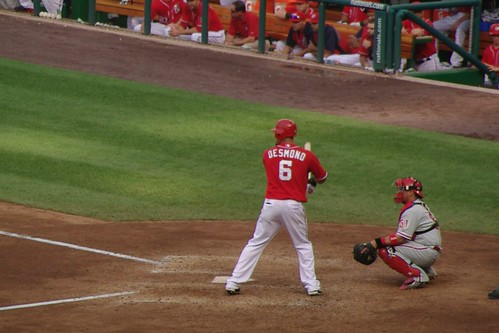
‘Desmond touches ’em all’
courtesy of ‘philliefan99’
Any Washington Nationals fan who bothered to sit through the entirety of Wednesday night’s 4-2 loss to the Arizona Diamondbacks would probably have felt a nasty shock of recognition. For one night, the Nationals of April and May re-emerged and reminded the 17,881 in attendance that there was a time when the team was in the bottom half of the National League table in every major offensive statistical category. They allowed 24-year-old Lynchburg native Daniel Hudson to come within one out of a complete-game shutout before back-to-back solo home runs by Laynce Nix and Jonny Gomes forced Hudson to yield to J.J. Putz, who forced Wilson Ramos to lift a foul popout to Lyle Overbay to end the game.
The Nationals weren’t helped by the absence of Jayson Werth from the lineup due to a mild groin strain, but more often than not, Washington was its own worst enemy. The pattern of self-destruction started in the first inning when Ian Desmond led off with a single to right field but was caught trying to steal second as the back end of a strike-‘im out, throw ‘im out double play. In the second inning, Michael Morse and Danny Espinosa led off the inning with singles before Hudson retired Nix, Gomes, and Ramos on one, two, and three pitches respectively. And with the exception of a one-out single by Desmond in the third inning, that was it as far as the Nationals offensive attack went until Nix dropped a double down the right field line with two outs in the seventh inning. In the interim, Hudson retired 17 of the 18 batters he faced, including 13 straight between Desmond’s single and Nix’s double.
No starting pitcher deserves that lack of support and Livan Hernandez certainly didn’t after he pitched seven innings and allowed two earned runs on four hits to go with no walks and six strikeouts. But Hernandez also didn’t deserve the bobble by Gomes that killed any chance that Justin Upton might be thrown out at home on Chris Young’s two-out double in the 4th that made the score 1-0. (Arizona added a second run later in the inning on an Overbay single). Hernandez didn’t deserve to have Davey Johnson “balk” and send him back out for the 8th (a mistake Johnson later took responsibility for). Hernandez didn’t deserve to have Nix airmail the cutoff man trying to nail Ryan Roberts at third, which allowed Gerardo Parra to get to second base with nobody out in the inning. One intentional walk later and Hernandez was getting a standing ovation on his way to the dugout, where he watched Henry Rodriguez surrender a two-run single to Miguel Montero that drove in what turned out to be the winning runs.
No, Hernandez didn’t deserve all that. But as a wise man once said, “Deserve’s got nothing to do with it.”
A Few Words About Mike Flanagan

‘Mike Flanagan and Rick Dempsey’
courtesy of ‘Keith Allison’
During the 8th inning of Wednesday night’s game, word circulated around the Nationals Park press box via Twitter that former Orioles pitcher Mike Flanagan was found dead on his Maryland property at the age of 59. I’ll leave it to others who actually have memories of him wearing the familiar orange and black to describe the experience of watching him pitch. I want to talk about the legacy he had already left behind.
Mike Flanagan (who was born three months and eight days after my own father) and I were born 36 years apart, but we came from the same place. Manchester, New Hampshire (pop. 110,000, give or take a few hundred) is technically the largest city in the Granite State, but in a lot of ways it functions like a small town. Flanagan’s sister Kathy is my mother’s hairdresser. By the time I reached adolescence and became aware of my town’s history, sporting and otherwise, Flanagan had long since retired. But signs of his greatness weren’t hard to find. Hanging above Manchester Memorial High School’s trophy case, which was full of game balls and other relics, was a plaque with Flanagan’s name and picture. It sat alongside Memorial’s other great athletes (including Steve Balboni, who made it to the major leagues a few years later after the crafty lefty), and I glanced at it every time I made my way to the school’s gym to broadcast a high school basketball game (something I always did with great trepidation as a student of Memorial’s great rival, Central High School). Outside ancient Gill Stadium, until recently the home football and baseball ground for all three of Manchester’s public high schools (as well as parochial Trinity High School), the names of the city’s greatest athletes were carved into wooden posts and placed all around the stadium’s perimeter in a sort of Ring of Honor. Among the most prominent of those names was, of course, Mike Flanagan.
All-Stars, Cy Young winners, and World Series champions aren’t supposed to come from a place like Manchester. The cold New England climate with its short, wet springs are more conducive to high school hockey, basketball, and cross-country than baseball. So even though Flanagan spent much of his career pitching for the hated Baltimore Orioles back when they (not the Yankees or the Red Sox) were the kings of the AL East and run by the Earl (Weaver, that is) of Baltimore), anyone who cared about sports in Manchester was conscious that the best professional athlete ever to set foot on its playing fields turned out to be an All-Star, a Cy Young winner, and a World Series champion. Not bad for a small town in a cold climate, and we who knew it were proud of him. We still are.